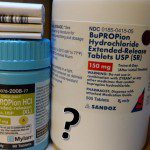[dropcap]W[/dropcap]hile there are many prescription options for migraine sufferers today, there are also many reasons why these prescription options may not be appropriate for all patients. As such, finding effective OTC remedies is critical to our approach to dealing with patients who suffer from migraines. One product, magnesium, has been studied and frequently found to be effective in the treatment of migraine headache. Magnesium appears to be effective both orally and intravenously. The authors of an article entitled “The role of Magnesium in pathogenesis and treatment of migraines” said:
“The available evidence suggests that up to 50% of patients during an acute migraine attack have lowered levels of ionized magnesium. Infusion of magnesium results in a rapid and sustained relief of an acute migraine in such patients. Two double-blind studies suggest that chronic oral magnesium supplementation may also reduce the frequency of migraine headaches. Because of an excellent safety profile and low cost and despite the lack of definitive studies, we feel that a trial of oral magnesium supplementation can be recommended to a majority of migraine sufferers. Refractory patients can sometimes benefit from intravenous infusions of magnesium sulfate.”
Another article entitled “Why all migraine patients should be treated with magnesium” in the Journal of Neural Transmission asserts:
“Considering these features of magnesium, the fact that magnesium deficiency may be present in up to half of migraine patients, and that routine blood tests are not indicative of magnesium status, empiric treatment with at least oral magnesium is warranted in all migraine sufferers.”
A publication by the American Headache Foundation on the role of magnesium for migraine sufferers says:
“In 2012, the American Headache Society and the American Academy of Neurology reviewed the studies on medications used for migraine prevention and gave magnesium a Level B rating, that is, it is probably effective and should be considered for patients requiring migraine preventive therapy. Because of its safety profile and the lack of serious side effects, magnesium is often chosen as a preventive strategy either alone, or with other preventive medications.”
While numerous studies and articles about the benefits of magnesium for the treatment and prevention of migraine headaches exist, we must also remember that not ALL studies have been equally supportive of these benefits. Individual patients will have varying degrees of response. This is true, however, with all medications. I am not suggesting that magnesium is a cure for everyone, nor am I suggesting that you change your current medication. Always talk to your doctor or pharmacist about using magnesium first.
HOW MUCH MAGNESIUM?
It seems to be generally accepted that a dose of around 400mg of magnesium daily would be effective for the prevention of migraine headaches. A range of 300mg to 500mg is probably fine. Check the product label carefully for the amount of magnesium in each tablet or capsule. Patients with compromised kidney function should check with their doctor before starting treatment with magnesium.
WHAT KIND OF MAGNESIUM?
There are various forms of magnesium on the market (e.g. magnesium oxide, magnesium chloride, chelated magnesium, etc.). There is limited data to suggest any one form of magnesium is superior to another. However, magnesium can cause some stomach irritation and diarrhea in some people. If this happens, there may be a justification for buying a slow-release form of magnesium (e.g. Slow-Mag).
While I understand there are limited studies showing the superiority of “brand name” supplements, I am personally more confident in the manufacturing processes of those companies who focus on a few specific types of products to specialize in. As such, I tend to steer my patients to reputable companies who have been around and emphasize quality manufacturing processes.
The following are several brands of magnesium you can purchase online or in your local pharmacy. I think if I had migraine’s I would probably lean toward the chelated form of magnesium in the “Doctor’s Best” brand below:
Slow-Mag:
From manufacturer website: “Slow-Mag® is formulated with magnesium chloride for increased absorption versus magnesium oxide. Most magnesium products contain magnesium oxide, a formulation which, though inexpensive and readily available, has been shown to be poorly absorbed by the body. The enteric coating allows Slow-Mag® to pass through the gastric juices of the stomach unchanged to reduce the chance of stomach upset. Slow-Mag® passes through the stomach to release magnesium in the small intestine.”
Mag-Ox 400:
From manufacturer website: “MAGOX® is calcined under exacting conditions in a computerized multiple-hearth furnace, guaranteeing uniform temperature and yielding high quality, consistent MgO. Premier is the only producer in North America using this technology. Most other sources of MgO are typically made in a rotary kiln, with only a single burner. Material temperature is thus more difficult to control resulting in inconsistencies that reduce reactivity, and end up costing the user more.”
Advance Magnesium by Innovix Labs:
From manufacturer website: Made with two of the best absorbed forms of Magnesium – Magnesium Bisglycinate and Magnesium Monomalate. Both types of magnesium are gentle on your stomach and both are chelated to provide high levels of absorption compared to magnesium oxide. Magnesium bisglycinate is a fully-reacted and non-buffered agnesium that is bound to two glycine amino acids. This increases its absorption and the additional glycine helps the body naturally relax. Magnesium monomalate is magnesium bonded to Malic acid. Malic acids gives green apples their tartness.”
Doctor’s Best Magnesium:
From manufacturer’s website: Doctor’s Best uses a patented, organic, chelated delivery form of magnesium to optimize bioavailability and GI tolerance. Doctor’s Best High Absorption Magnesium is not buffered, meaning that is it not mixed with less expensive and less absorbable magnesium oxide. Gluten Free, Non-GMO, Vegetarian, Vegan.”
DRUG INTERACTIONS WITH MAGNESIUM:
Magnesium may interact with other medications, often by causing changes in the way the drug is absorbed. Check with your doctor or pharmacist if you are taking digoxin, levothyroxine, alendronate, tetracycline-type antibiotics or quinolone-type antibiotics, certain HIV medications. This is not a full list of the potential drug interactions. Always check your medications for potential interactions before starting magnesium.
COMMON SIDE EFFECTS:
Stomach upset, nausea, vomiting, diarrhea, gas or cramping.
©Jason Poquette and The Honest Apothecary. Unauthorized use and/or duplication of this material without express and written permission from this blog’s author and/or owner is strictly prohibited. Excerpts and links may be used, provided that full and clear credit is given to Jason Poquette and The Honest Apothecary with appropriate and specific links to the original content.
headache Magnesium Migraines Pharmacy
Last modified: August 5, 2016

















